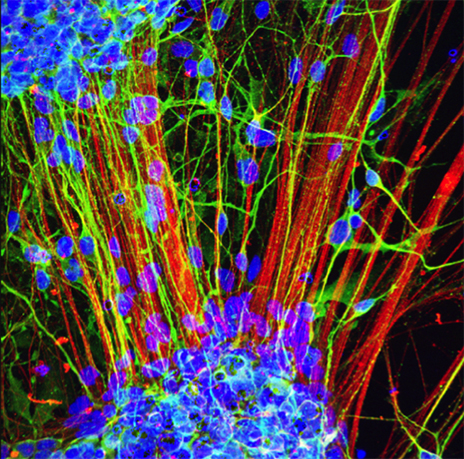
Neurons derived from skin cells of patients with schizophrenia express high levels of a protein linked to Alzheimer’s, researchers have found. (Courtesy of Icahn School of Medicine at Mt. Sinai)
New research from Yale University shows that an increase in the STEP (STriatal-Enriched protein tyrosine Phosphatase) protein leads to a disruption of synaptic function and contributes to cognitive disorders.
A specific protein implicated in the cognitive decline of Alzheimer’s disease also appears to play a role in genetic predisposition to schizophrenia, meaning that a drug that targets that protein could treat a variety of neuropsychiatric disorders, according to a new study to be published in the journal Molecular Psychiatry.
Yale researchers have been studying the role that the STEP (STriatal-Enriched protein tyrosine Phosphatase) protein plays in the healthy functioning of synapses — the connections between brain cells. Excessive amounts of STEP protein are found in the brains of humans and animal models of Alzheimer’s disease, Parkinson’s disease, fragile X syndrome, and schizophrenia. The increase in STEP leads to a disruption of synaptic function and contributes to the cognitive deficits present in these disorders.
The research was led by Yale’s Paul Lombroso, the Elizabeth Mears and House Jameson Professor in the Child Study Center and professor of neurobiology and psychiatry, and Kristen Brennand at the Icahn School of Medicine at Mount Sinai.
In previous work, Lombroso and colleagues have shown that an experimental drug designed to inhibit the STEP protein restores cognitive deficits in a mouse model of Alzheimer’s disease. In the new paper, Lombroso shows that genetically eliminating STEP or using the drug to inhibit STEP activity improves cognitive deficits in a mouse model that has behavioral features related to symptoms of schizophrenia. A team led by Brennand also found increased levels of STEP in human stem cells derived from skin cells taken from two groups of schizophrenia patients. A STEP inhibitor applied to those human stem cells corrected some of the biochemical and electrophysiological deficits that characterized these abnormal cells.
While the drug used in the earlier Alzheimer’s experiments has proven difficult to develop for clinical use, Lombroso said he and colleagues at Yale (professors Eric Ellman in chemistry and Angus Nairn in psychiatry) are developing new STEP inhibitors and, if successful, these may have more practical therapeutic value.
“These findings suggest that a STEP inhibitor, when discovered, may be the basis of a new drug that can treat a number of neuropsychiatric disorders,” Lombroso said.
Jian Xu of Yale and Brigham J. Hartley at the Icahn School of Medicine at Mount Sinai are co-lead authors of the paper.
The research was funded by the National Institutes of Health, the New York Stem Cell Foundation, and the Brain and Behavior Research Foundation.









STEP proteins are useful for keeping neuronal synapses healthy only upto certain level above which they become harmful to disrupt the synapses and cause beta amyloid plaques to form on the brain leading to Alzheimerism and they may also disrupt the production of neurotransmitters in the brain leading to Parkinson’s disease. The balancing act of STEP proteins are essential and in some cases they are genetically inherited to cause Schizophrenia in a family. Proteins , Hormones and Enzymes are the product of human cells which should work within a framework of limit. The delicate mathematics is given in the DNA code of all humans and when they go haywire we suffer. Thank You.